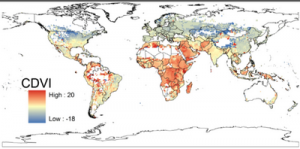Emerging threatsClimate change impacts may appear in some areas sooner than expected
Some impacts of global climate change will appear much sooner than others — with only moderate increases in global temperature. While rising sea levels may one day threaten the commuter tunnels and subway lines of New York City, it will have effects much sooner in other parts of the world – for example, the Marshall Islands and Bangladesh. In countries exposed to the destructive effects of climate change sooner rather than later, there will be little incentives to do something about climate change because the damage has already been done. Thus, once significant portions of the Marshall Islands or Bangladesh are destroyed by rising seas, the rate of damage will reach “saturation” — an inflection point beyond which further temperature increases have little additional effect. Once the Marshall Islands are large sections of Bangladesh are uninhabitable, there is not more damage that can be done there, and the governments of these countries will not have an incentive to participate in global climate efforts because they will not have anything more to lose.

Climate Demography Vulnerability Index // Source: climate.gov
For the 70,000 residents of the Marshall Islands, global climate change is not a theoretical concern with far-off potential consequences. The island nation is nowhere more than six feet above the Pacific Ocean, and because sea levels are already rising, the nation’s leaders have made plans to move to higher ground in the Fiji Islands.
Some impacts of global climate change will appear much sooner than others — with only moderate increases in global temperature. While rising sea levels may one day threaten the commuter tunnels and subway lines of New York City, it will have effects much sooner in other parts of the world. Rising temperatures may one day make parts of the globe uninhabitable, but far lower temperatures may have already begun to decimate coral reefs. Agriculture may also begin to feel the effects well before temperatures rise more than a few degrees globally.
Georgia Tech notes that a commentary paper published this week in the journal Nature Geoscience argues that only immediate and aggressive efforts to mitigate the effects of climate change can head off these accelerating near-term impacts As more impacts occur, the incentives for addressing the causes of climate change will themselves change, the paper’s authors warn.
“Our argument is that if you want to do something, you’d better do something now because over time, you are going to lose the ability to have an impact,” said Juan Moreno-Cruz, an assistant professor in Georgia Tech’s School of Economicsand one of the paper’s five co-authors. “If we delay action on climate change, the likelihood of doing something will be reduced because the damages will be accelerating. The incentives to address it are going to disappear as more damage occurs.”
Climate impacts are often assumed to increase steadily with global temperature increases, but this is not true for all impacts. The scaling of many climate change impacts with temperature may have a nonlinear sigmoidal pattern, with a dramatic initial impact followed by a leveling off as warming continues, says the paper, which was co-authored by Katharine Ricke and Ken Caldeira at the Carnegie Institution for Science at Stanford, and Jacob Schewe and Anders Levermann at the Pottsdam Institute of Climate Impact Research.
